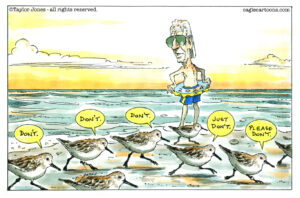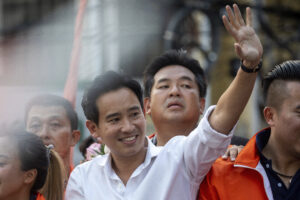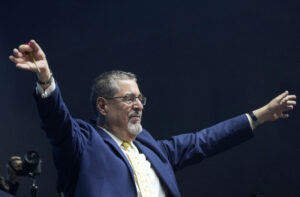Turkey’s Erdogan Claims Presidential Election Victory
Unofficial election returns show him with enough votes to serve another term, one that carries new executive powers. Critics had warned about re-electing Erdogan, citing his increasingly autocratic tendencies.ISTANBUL—Turkey’s President Recep Tayyip Erdogan declared victory after unofficial election returns Sunday showed him with enough votes to serve another term that carries new executive powers.
“The nation has entrusted to me the responsibility of the presidency and the executive duty,” Erdogan said in televised remarks from Istanbul after a near-complete count carried by the state-run news agency gave him the majority needed to avoid a runoff.
The presidential election and a parliamentary election also held Sunday, both more than a year early, complete NATO-member Turkey’s transition from a parliamentary system of government to a strong presidential system. Voters approved the change in a referendum last year.
Erdogan, 64, insisted before the election that the expanded powers — which include the authority to impose states of emergency and to issue decrees — would bring prosperity and stability to Turkey, especially after a failed military coup attempt in 2016. A state of emergency has been in place since the coup.
The president’s critics, however, warned that Erdogan’s re-election would cement the grip on power of a leader who they accuse of showing increasingly autocratic tendencies.
Official results were to be declared by the country’s electoral board.
Results carried by the state-run Anadolu news agency with more than 96 percent of ballot boxes counted showed Erdogan winning an outright majority of 52.6 percent, far ahead of the 30.75 percent for his main contender, the secular Muharrem Ince.
Kurdish candidate Selahattin Demirtas, who ran his campaign from prison where he is being held pending trial on terrorism-related charges, was garnering 8.1 percent. He has called the charges trumped-up and politically motivated.
However, Ince said the results carried on Anadolu were not a true reflection of the official vote count by the country’s electoral board. In a tweet earlier in the evening, he said only 37 percent of ballot boxes had actually been counted, as opposed to the more than nearly 90 percent Anadolu was reporting at the time. He accused the agency of “manipulation” of the results.
Erdogan also declared victory for the People’s Alliance, an electoral coalition between his ruling Justice and Development Party and the small Nationalist Movement Party, saying they had a “parliamentary majority” in the 600-member assembly.
The unofficial results for the parliamentary election showed Erdogan’s Justice and Development Party, or AKP, losing its majority, with 293 seats in the 600-seat legislature. However, the small nationalist party the AKP was allied with garnered 49 seats.
“Even though we could not reach out goal in parliament, God willing we will be working to solve that with all our efforts in the People’s Alliance,” Erdogan told cheering supporters outside his official residence in Istanbul.
The pro-Kurdish Peoples’ Democratic Party, or HDP, was passing the 10 percent threshold required to enter parliament with 11.2 percent. Managing to get into parliament would be significant for HDP, since nine of its lawmakers, including Demirtas, and thousands of party members were jailed during the campaign.
The party said more than 350 of its election workers have been detained since April 28.
Ince, speaking just after polls closed, warned civil servants involved in the vote count to do their jobs “abiding by the law” and without fear, suggesting they were under pressure by the government. He asked all Turks to be vigilant at polls and not be “demoralized” by what he called the possible manipulation of news.
Erdogan, who has been in power since 2003, had faced a more robust, united opposition than ever before. Opposition candidates had vowed to return Turkey to a parliamentary democracy with strong checks and balances and have decried what they call Erdogan’s “one-man rule.”
Erdogan is the most powerful leader since the founder of the Turkish republic, Mustafa Kemal Ataturk. He remains popular in the conservative and pious heartland, having empowered previously disenfranchised groups.
From a modest background himself, he has presided over an infrastructure boom that has modernized Turkey and lifted many out of poverty while also raising Islam’s profile, for instance by lifting a ban on Islamic headscarves in schools and public offices.
But critics say he has become increasingly intolerant of dissent and opposition. The election campaign was heavily skewed in his favor, with opposition candidates struggling to get their speeches aired on television. Erdogan directly or indirectly controls most of Turkey’s media.
Ince, a 54-year-old former physics teacher, was backed by the center-left opposition Republican People’s Party, or CHP. He wooed crowds with an unexpectedly engaging campaign, drawing massive numbers at his rallies in Turkey’s three main cities of Istanbul, Ankara and Izmir.
More than 59 million Turkish citizens, including 3 million expatriates, were eligible to vote. Erdogan called the election more than a year early amid signs the country could be heading toward an economic downturn.
The head of Turkey’s electoral commission said authorities had taken action following reports of irregularities at voting stations in southeastern Turkey. Videos posted on social media appeared to show people voting in bulk at a ballot box in the town of Suruc in Sanliurfa province.
The Organization for Security and Cooperation in Europe was monitoring the elections with over 350 observers. Election monitors criticized Turkey for denying entry to two monitors who Turkey accused of political bias.
Peter Osusky, head of the OSCE Parliamentary Assembly delegation, told The Associated Press all observers “are strongly adhering to so-called code of conduct” regardless of their political opinions.
Recent changes to electoral laws allow civil servants to lead ballot box committees. Ballot papers that don’t bear the official stamps will still be considered valid — a measure that led to allegations of fraud in last year’s referendum.
Citing security reasons, authorities have relocated thousands of polling stations in predominantly Kurdish provinces, forcing some 144,000 voters to travel further to cast their ballots. Some will even have to pass through security checkpoints to vote.
The vote took place under a state of emergency declared after the failed coup attempt, which allows the government to curtail civil rights. Some 50,000 people have been arrested and 110,000 civil servants have been fired under the emergency powers, which opposition lawmakers say Erdogan is using to stifle dissent.
__
Fraser reported from Ankara. Mehmet Guzel in Ankara contributed.
Your support matters…Independent journalism is under threat and overshadowed by heavily funded mainstream media.
You can help level the playing field. Become a member.
Your tax-deductible contribution keeps us digging beneath the headlines to give you thought-provoking, investigative reporting and analysis that unearths what's really happening- without compromise.
Give today to support our courageous, independent journalists.






You need to be a supporter to comment.
There are currently no responses to this article.
Be the first to respond.